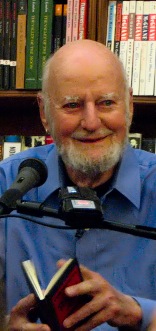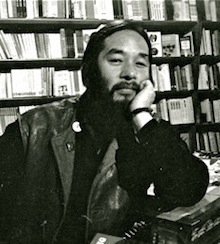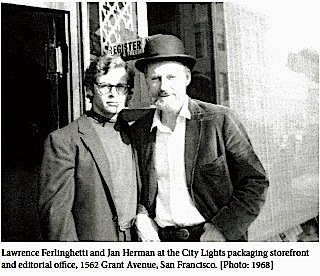A literary era passes. It was already past, yet it still has influence. Maybe the biggest. Because ArtsJournal was down yesterday—I know not why—I couldn’t post this. The world didn’t miss it. My account is minimal in the scheme of things but here ‘tiz anyhow, excerpted from My Adventures in Fugitive Litrichur.
When I got to San Francisco — it was June 1966 — I looked up a college friend, Jimmy Parker, who was living in North Beach and working at City Lights Books. He mentioned me to Shig Murao, who managed the store. Shig was impressed that I had dropped out of grad school and went to work in a bookshop. It was not just any bookshop but the 8th Street Bookstore in Greenwich Village, which had a literary reputation as a sort of East Coast sister to City Lights. Shig hired me on the spot.
To be a clerk at City Lights was an intimate privilege. Far more bohemian than 8th Street, City Lights at that time had the atmosphere of a funky Left Bank cave with flimsy cellar bookshelves partly made of orange crates, some rickety chairs and café tables for reading, and a lone clerk sitting at the top of the stairs by the front door ringing up sales on an old-fashioned cash register. Lawrence, who owned the store, still took an occasional turn at the register. And if Shig had confidence in you, he left you alone to do your thing.
At some point he gave me a key to the store and asked me to open up on Sunday mornings. The streets of North Beach would be deserted. Across from the store, at Columbus and Broadway, the topless clubs were closed. The morning sunlight was sharp and bright, and I recall the pleasure of sitting at the cash register reading undisturbed for as much as an hour or two until the first customers drifted in.
One of the great things about clerking there was that you met everybody who came through the door. You were like a gate- keeper. The people who walked in could be anybody. You met all kinds. Bill Graham, the rock promoter, showed up once a week with his Fillmore concert posters to put in the window. Honest- to-god poetry lovers stopped by to check the mimeo magazines.
A guy in a three-piece suit came up from the basement one time with $80 worth of mimeos under his arm. He turned out to be D.J.R. Bruckner, then the Chicago bureau chief of the Los Angeles Times. Bob Kaufman, the poet of Solitudes, would appear suddenly just inside the door and rock back and forth, his eyes fluttering. He was like a ghost. Never said a word. Neal Cassady blew in once. He wanted to cash what was more than likely a bad check. Lawrence had called ahead,
“Don’t give him any money.” I didn’t. Cassady was offended, but jaunty about it. “Some millionaires don’t even put salt on their table,” he said, and blew back out.
After I’d been a clerk for about a year, Shig told me Lawrence was looking for an editorial assistant. Why didn’t I ask him for the job? By then the City Lights shipping department had grown too large to remain hidden behind the cellar bookshelves. Lawrence moved the operation to a corner storefront on upper Grant Avenue and put his editorial office in a small apartment above it. He told me he needed someone to handle permissions requests, publishing correspondence, some of his own mail, and editorial chores like proof reading. Was I willing? It was a step up from the cash register. Of course I was willing. For the next two years we shared a room overlooking Filbert Street. Lawrence’s desk, an old-fashioned rolltop, was in one corner. My desk was in another corner. A second room had a futon on the floor and little else. A third closet-size room held the editorial files.
I’ve been asked what it was like working for Lawrence at such close quarters. I found him an easy boss to work for. He was clear in his expectations. He didn’t look over my shoulder or try to micromanage whatever I was doing. He was also very self-contained. Never gossiped. Rarely made small talk. His reputation for being tight with money was true, but contrary to Cassady’s insult, he was generous with his possessions. There were times he lent me his cabin in Big Sur, and when I didn’t have a car he gave me his VW bus to get there.
Had I stayed in New York I might never have done a little magazine. But the intimacy of the Bay Area literary scene, which teemed with poets, combined with the advantage of my position at City Lights, which was a nexus for San Francisco’s small-press publishers, spurred me to it. . . .
Naturally I asked Lawrence for a contribution to the first issue, which appeared in the fall of 1967. He gave me a diaristic account of his trip to Berlin earlier that year for the LIterarisches Colloquium in Wansee. His really significant contribution, however, was a generous offer to put the magazine in the City Lights catalog. This meant nationwide distribution, which it would not have had otherwise.
The last time I spoke with Lawrence was 20 years ago when Gregory Corso died. At the time I was working at msnbc.com and I believe I quoted what he said, though I don’t recall what it was. It’s long gone now, floating somewhere in cyberspace or nestled in a niche of the internet archive.
So long, Lawrence. Requiescat in pace.




When I first discovered City Lights Pocket Poets there were only about 14 in the series and probably like other young and poetically naïve would-be teen Beats found that Ferlinghetti’s work was the most accessible, humorous and topical. Of course there was much more to him than that, but he never lost his directness. When he was in England in 1988, in an interview with Alexis Lykiard he said “…by definition the poet is the bearer of Eros, the bearer of the free spirit, the love-seeking, pleasure-seeking being, and just by that definition he’s per se an enemy of the state. Has to be. And therefore what he writes, or what he paints, should be subversive. Or else it’s just a leisure-class activity.”
Thanks for this evocative depiction, Jan. I first went to City Lights the day I hit SF as a college senior on a supposed “work” term (spring 1972) and the whole front window was filled with just-published Erections, Ejaculations, Exhibitions and General Tales of Ordinary Madness, which I bought immediately and got read fast through the next challenging weeks. Hurrah Lawrence Ferlinghetti, for his store, poems and more.